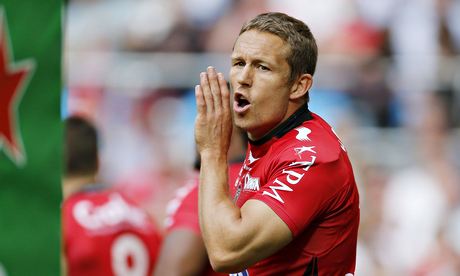
It is difficult to picture Jonny Wilkinson, English rugby's arch executioner, dreaming of what others have, but once he had steered Toulon to a second consecutive Heineken Cup final he mused on how Europe's greatest prize had passed him by for so many years. That great triumph that will forever define him has tended to obscure a relatively modest club career that is only now reaching heights that better become him.
"I spent years watching people winning this competition and dreaming about it myself," he said. "We [Newcastle, his former club] had a couple of shots at it, in one of which we got out of the group stage, and in the other we had great experiences against Leinster, Toulouse, and these sorts of guys. Now it's an amazing thing just to experience it – but to get into the latter stages and find yourself on the winning side is the other side of that dream. It's great in a way that it's happening at the end of my career, rather than at the start.
"I'm really proud of the guys and the way they chip in. These games do go either way. They turn. There's no way you have the right to say at start that you'll win or not. You just give it everything and when those moments come you've just got to be present, do the right things and hang in there. To keep asking that question of your players is a hell of a demand and for them to keep coming through is a hell of a response."
Here we are, more than 10 years after that famous night in Sydney, and not a lot has changed. The intensity oozes from his every pore. That left boot is as relentlessly accurate as ever. Let it be recorded that in the 24th minute he did miss one relatively straightforward kick, which caused something of a stir. No matter, he knocked his next over three minutes later, from an angle and distance so testing it was almost as if he chose it to punish himself.
What will actually be recorded is that he amassed another 21 points in a career overflowing with them. In so doing he has earned a shot at adding a second Heineken Cup title to the World Cup, Premiership and English cup titles he already holds. It is looking quite the haul now. He has not entirely confirmed his retirement at the end of the season – mainly because, as he reiterated here, he never looks beyond the next game – but when he does it will be with a trophy cabinet worthy of the legend. Saracens stand in the way on the European front. Although he has not yet watched their extraordinary win over Clermont Auvergne, he has been impressed.
"I have the greatest respect for Saracens. They stand out for their thoroughness and professionalism. This year they have found the capacity to play better than last against anyone. If we don't take to the field with 100% focus we'll get annihilated like Clermont did."
But as one legend marches on to another Heineken Cup final, another bows out. It seems too much to bear that the words Munster and Heineken Cup will never again be spoken. Rob Penney, their coach, who has overseen the great saga for the past two years but moves on at the end of the season, like the Heineken Cup itself, cut a melancholic figure afterwards. "I'm very hollow," he said, "and I'm hurting for the boys."
Munster were up against it on a man-for-man level, but collectively as ever they found spirit and resource to keep the game alive until the very end. They were mercilessly whistled out of things in the first half, particularly at scrum time (despite not obviously suffering), then convinced the referee to favour them in the second (when their scrum did seem to get a nudge on).
"I thought we got ourselves into really good positions," said Penney, "and then we would make an error. We thought we might end up with two or three clear opportunities, but we ended up with five or six – and took one. That is the frustration. Jeepers. The boys prepared really well and had petrol in the tank but for some reason we just didn't have the accuracy.
"I think there was probably a lot of doubt whether we could come here and compete like that. All that doubt was outside the dressing room. I'd love another shot at it. The lads didn't think it was too daunting. They felt they were in with a shout from the start. Small margins … small margins."

